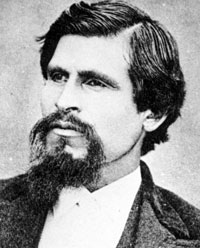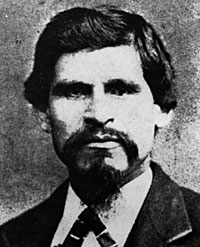
TIBURCIO VÁSQUEZ (1839-1875)
"Bandit," "womanizer," "archenemy of the California government," and "hero" are words used to describe Tiburcio Vásquez, the famous California fugitive likened to Joaquín Murrieta. Vásquez had his first run-in with the law when he was seventeen after he was linked to the fatal stabbing of Constable William Hardmount. Instead of standing trial, Vásquez fled with a friend and began his life as a bandit and rustler throughout central and southern California. In 1856 Vásquez was caught rustling horses and was sentenced to five years at San Quentin. Upon his release, he went back to his life of crime and, consequently, would serve three additional terms at the notorious prison. In 1873, Tiburcio Vásquez became a household name after he murdered three men and committed a robbery in Tres Pinos, near Hollister. Governor Newton Booth retaliated by offering a hefty $1,000 reward for the bandit's capture. Knowing he was a wanted man, Vásquez fled to the California mountains, often resting at small ranches where he met and romanced many a young woman.
Tiburcio's crime spree intensified, prompting Booth to increase the reward on his head to $8,000 for a live capture and $6,000 for his dead body. The search for Vásquez was laborious: he often sought refuge in the canyons and rocks near the Tejon Pass in an area now known as Vásquez Rocks. The massive manhunt finally paid off: authorities received a tip that Vásquez was hiding out at a local ranch. On May 13, 1874, he was captured, and his highly publicized trial drew enormous crowds of mostly admiring women (he never lost his allure even when caught) and Hispanics who viewed Vásquez as both hero and avenger. He was found guilty and sentenced to death.